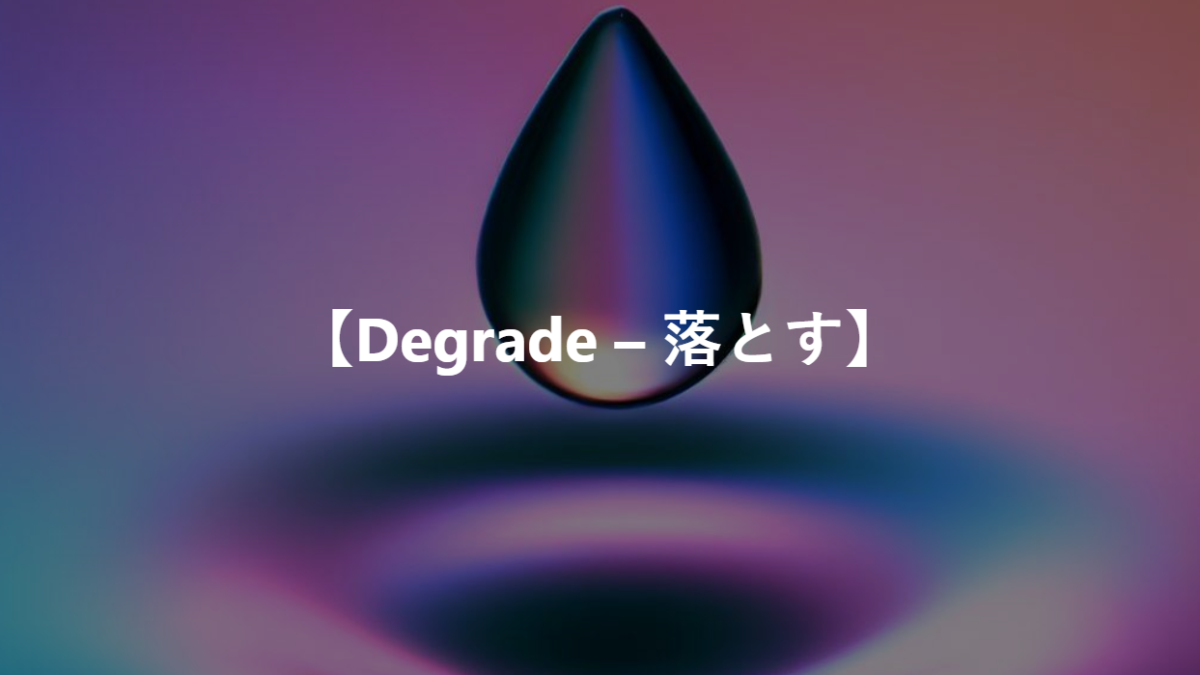Degrade /dɪˈɡreɪd/
品位を落とす、劣化させる、分解する
人や物の価値、質、品位などを低下させること。また、化学物質などがより単純な物質に分解されること。
「他人をdegradeする行為は、結局自分自身を貶める」
📚 意味と用法
degrade は、動詞として、何かをより低いレベルや状態に落とすことを意味します。一つは、人の尊厳や評判などを傷つけ、「品位を落とす」「辱める」という使い方です。もう一つは、物質や環境の質が「劣化する」「悪化する」という意味です。化学の文脈では、複雑な化合物が「分解する」ことも指します。
人を辱める (To humiliate someone)
Such comments degrade women.
(そのようなコメントは女性の品位を落とすものだ。)
品質が劣化する (To deteriorate in quality)
Plastic slowly degrades in the environment.
(プラスチックは環境中でゆっくりと分解される。)
🕰️ 語源と歴史
「Degrade」は、ラテン語の「degradare」に由来します。これは「階級を下げる」という意味で、接頭辞「de-」(下へ)と「gradus」(歩み、段階、階級)から成り立っています。”grade” (等級) や “gradual” (段階的な) と同じ語源です。「段階を下げる」という元の意味が、価値や質、品位を「低下させる」という現代の幅広い意味に発展しました。
🔄 類義語
⚡ 対義語
関連する対比
何かを degrade (劣化させる) のは、その質を improve (改善する) こととは正反対です。
💬 実践的な例文
Pornography can degrade people, especially women.
ポルノグラフィは人々、特に女性の品位を落とす可能性がある。
The quality of the audio signal degrades over long distances.
音声信号の品質は、長距離になると劣化する。
He felt degraded by their insulting remarks.
彼は彼らの侮辱的な発言に辱められたと感じた。
This type of plastic is designed to degrade quickly.
この種のプラスチックは、速やかに分解するように設計されている。
Don’t degrade yourself by lying.
嘘をついて自分の品位を落とすな。
🧠 練習問題
以下の空欄に入る最も適切な単語を選んでください。
1. The process of breaking down or deteriorating is called ______.
解説:
分解や劣化のプロセスは、名詞の “degradation” です。
2. To treat someone with disrespect and lower their dignity is to ______ them.
解説:
誰かを軽蔑し、その尊厳を傷つけることは、その人を「辱める (degrade)」ことです。
3. The opposite of “degrade” is to ______.
解説:
“degrade”(格下げする、劣化させる)の対義語は、「格上げする」を意味する “upgrade” です。
4. The root “gradus” in “degrade” relates to a(n) ______.
解説:
語源で説明した通り、ラテン語の “gradus” は「段階」や「等級」を意味します。
5. It was a ______ experience that made him feel worthless.
解説:
彼に無価値だと感じさせたのは、「屈辱的な (degrading)」経験でした。

